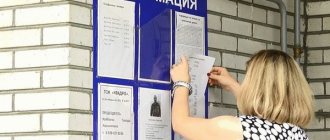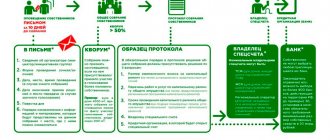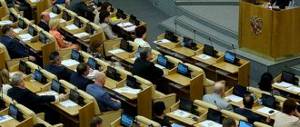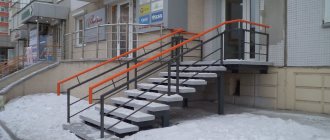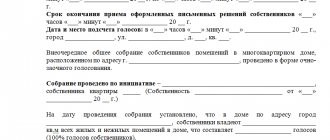Source: RosKvartal® - Internet service No. 1 for management organizations
The final decision of the general meeting must be formalized in the form of minutes of the general meeting with all voting ballots attached to it. The minutes must be drawn up in writing no later than 10 days from the date of the meeting, since no later than this period the results of the meeting must be brought to the attention of the owners of the premises in the house (Part 3 of Article 46 of the Housing Code of the Russian Federation).
In the case of an absentee meeting or an absentee part of an in-person meeting, this period is fixed from the end of the reception of written decisions of the owners, established in the notice of the general meeting. All data must correspond to those specified in the notification of the OSS.
The requirements for the preparation of the protocol are established by order of the Ministry of Construction of the Russian Federation dated January 28, 2019 No. 44/pr. The secretary of the general meeting, whose candidacy was selected at the OSS, conducts and draws up the minutes.
Protocol header
- title of the document “Minutes of the general meeting of owners of premises in an apartment building”;
- date (the date of the minutes is the date of summing up the results of the general meeting: the end of the counting of votes) and the registration number of the minutes (serial number from the beginning of the calendar year);
- date of the meeting (if the meeting lasted several days, then the start date and end date of the meeting are indicated);
- place of the meeting (indicate the address at which the meeting was held in person, or the address at which decisions were collected if the meeting was held in absentia);
- title to the content part (must contain information about the address of the MKD, the type of general meeting and the form of its holding).
The decision of the general meeting of owners is binding for everyone
Execution of the decision of premises owners to choose the direct method of managing an apartment building is mandatory for everyone, including local governments. In accordance with Part 2 of Art. 161 of the Housing Code of the Russian Federation, owners of premises in an apartment building have the right to choose, as a method of managing an apartment building, direct management of the owners of premises in an apartment building, the number of apartments in which is no more than thirty. According to Part 3 of Art. 164 of the Housing Code of the Russian Federation, on the basis of a decision of the general meeting of owners of premises in an apartment building, directly managing such a building, on behalf of the owners of the premises in relations with third parties, one of the owners or another person authorized to act, certified by a power of attorney issued to him in writing, has the right to act by all or the majority of premises owners. According to Article 44 of the Housing Code of the Russian Federation, the general meeting of owners of premises in an apartment building is the management body of the apartment building. Depending on the chosen method, both the owners of the premises can manage an apartment building (when the house is directly managed by the owners; when the house is managed by management organizations in the form of homeowners' associations, housing and housing-construction cooperatives (HOA, LCD and ZhBC), as well as other management organizations. Article 46 of the Housing Code of the Russian Federation provides that decisions of the general meeting of owners of premises in an apartment building on issues put to vote are adopted by a majority vote of the total number of votes of the owners participating in the meeting. Decisions of the general meeting are documented in minutes. Decisions adopted by the general meeting, as well as the voting results are brought to the attention of the owners. The decision of the general meeting, adopted in the manner prescribed by this Code, on issues within the competence of such a meeting, is binding on all owners of premises in an apartment building, including those owners who did not participate in the voting. The validity of the decision of the general meeting is expressed in the fact that it entails legal consequences for all owners of premises in the house, including those who did not participate in the vote or voted against its adoption. Thus, decisions made by the general meeting of house owners, whose residents have chosen the direct method of management, if there is municipal housing (at least one apartment) in this apartment building, are binding on the administration of the settlement on whose territory these apartment buildings are located. Zhanna Botalova, acting district prosecutor of the Yusvinsky district First Perm legal portal
Contents of the protocol
- Information about the initiator of the OSS: for legal entities, full name, OGRN, record number of the state registration of the legal entity, TIN; for individuals - full name in accordance with the identification document, room number and details of the document confirming ownership of such premises;
- Information about the chairman, secretary and members of the counting commission: full name, room numbers and details of documents confirming ownership of the specified premises (if the issue of choosing these persons is not included in the agenda of the meeting);
- Information about those present and invited;
Those present are those owners who attended the meeting in person. The invitees can be different people, for example, a lawyer who can explain some legal issues to the owners.
For invited persons, the protocol indicates the full name, passport details and purpose of participation - for individuals; OGRN, name of the legal entity, if necessary - power of attorney (for legal entities).
- Quorum information;
You need to indicate the total number of votes (separately for residential and non-residential premises), the next line is the presence of a quorum. The number of votes of owners present at the meeting, expressed as a percentage of the total number of votes, is the quorum.
- Information on the total area of residential and non-residential premises in the apartment building;
- Agenda;
All items on the agenda must be numbered. For each question, the wording of the question is written, who voted how, who did not take part in the vote, and what decision was made. All wording must be in the third person plural - “adopted”, “decided”, “decided”.
- The place where the OSS documents (copies) will be stored;
- Signatures.
The protocol must be signed by at least three persons: surnames, initials and signatures of the chairman, secretary, and counting commission. There may be one person on the counting commission, but if there are more, then everyone signs. Next to the signature there should be the date when the document was signed (clause 4 of the order of the Ministry of Construction of the Russian Federation dated January 28, 2019 No. 44/pr).
If the candidates for chairman, secretary and counting commission were rejected at the meeting, the minutes are signed by the initiator of the meeting.
Vote counting
OSS is the governing body of the MKD. On it, the owners discuss issues on the agenda and make decisions on issues put to vote (Part 1 of Article 44 of the Housing Code of the Russian Federation).
The OSS is carried out through voting (Article 44.1 of the RF Housing Code). Owners of premises in a given building can vote (Part 1, Article 48 of the Housing Code of the Russian Federation). It turns out that the participants in the meeting can be the owners of the apartment building premises: legal entities and individuals who, by right of ownership, own residential and non-residential premises in the apartment building. OSS participants cannot have premises in an apartment building or shares in common property.
The number of votes that each owner of the premises in the house on the OSS has is proportional to his share in the right of common ownership of common property (Part 3 of Article 48 of the Housing Code of the Russian Federation). This share is one and indivisible, it cannot be distributed into several shares.
The share in the right of common ownership of the common property of the owner of the premises is proportional to the size of the total area of the specified premises (Part 1 of Article 37 of the Housing Code of the Russian Federation).
It turns out that the number of votes that the owner of a particular premises has is proportional to the area of the premises owned by this owner.
If the owner wants to vote differently on the same agenda items or is going to vote only part of the votes, he will not succeed. The number of votes of the owner cannot be divided into parts.
Each owner makes only one decision on each issue on the agenda, regardless of the number or area of premises he owns (Clause 3, Part 5.1, Article 48 of the Housing Code of the Russian Federation). It is impossible to vote with a portion of the total number of votes that the owner has; this is contrary to housing legislation.
To determine that a positive decision was made on the issues on the agenda, it is necessary to determine the share of votes cast by the owner of the premises in the apartment building from the total number of votes taking part in the OSS (Part 1 of Article 46 of the Housing Code of the Russian Federation). All votes held by the owner are taken into account when determining the presence of a quorum.
The Ministry of Construction of the Russian Federation notes that the owner of premises in an apartment building does not vote partly in the OSS; all votes of the owner are taken into account when summing up the voting results. Only one decision can be made on each item on the agenda.
Notification of owners and public housing estates about the results of the general meeting of owners
6260012
Mandatory annexes to the protocol
Each protocol has a number of mandatory annexes, without which decisions of the OSS can be challenged as invalid (clause 20 of the order of the Ministry of Construction of the Russian Federation dated January 28, 2019 No. 44/pr).
1. Register of premises owners
It is necessary to indicate for each owner:
- Full name of the individual,
- name and OGRN of the legal entity,
- numbers of premises belonging to them,
- the number of votes owned by the owner.
2. Notice of the OSS
3. Register of delivery of notification of the OSS to the owners
An exception is the case when at one of the previous general meetings of owners a decision was made on a different method of notification - not by registered mail or delivery against signature, but, for example, by posting a notice on an information stand. In other cases, a register must be submitted in which the owners have signed, or a register of postal items.
4. List of owners of apartment building premises who were present at the in-person part of the meeting, as well as a list of invited persons
This list must also contain information about all owners of the premises (or their representatives).
5. Powers of attorney or copies thereof
This application is needed if there were representatives of the owners at the meeting. All powers of attorney are filed with the protocol.
6. Documents that were discussed on the agenda and about which decisions were made
For example, if a management agreement was adopted at the OSS, its text is attached.
7. Owner decisions
This is the most voluminous application. All decisions must be properly documented.
8. Other documents or materials that the decision of the OCC itself indicates as mandatory annexes to the protocol.
Template for minutes of the general meeting of owners.docx
Article 46. “Housing Code of the Russian Federation” dated December 29, 2004 N 188-FZ (as amended on April 30, 2021)
1. According to Part 1 of the commented article, the decision of the general meeting of owners of premises in an apartment building is documented in a protocol. The minutes of the general meeting are drawn up in writing within the time limits established by the general meeting, but no later than 10 days after the general meeting (clause 2 of the Requirements for the preparation of minutes of general meetings of owners of premises in apartment buildings, approved by the Order of the Ministry of Construction of Russia dated December 25, 2015 . N 937/pr).
The minutes of the general meeting indicate the name of the document, the date and registration number of the minutes, the date and place of the general meeting, the title to the content of the minutes, the content of the minutes, the agenda, the presence of a quorum, the number of votes on each issue, the place (address) of storage of the minutes, list of applications (if indicated in the content of the protocol). The minutes are signed by the chairman, secretary of the meeting and members of the counting commission.
The person on whose initiative the general meeting was convened must submit copies of the decisions and minutes of the general meeting of owners of premises in an apartment building to the management organization, the board of the HOA, residential complex, housing cooperative, or other specialized consumer cooperative no later than 10 days after the general meeting.
According to part 1.1 of the commented article, the organization managing the apartment building, the board of the HOA, housing complex, housing cooperative, other specialized consumer cooperative, within five days from the receipt of the specified copies of decisions and the minutes of the general meeting of owners of the premises are obliged, in the manner prescribed by law, to send copies of these decisions and protocol to the state housing supervision authority for storage for three years. Moreover, the state housing supervision body, if within three months in a row it receives two or more minutes of the general meeting of owners of premises in an apartment building, containing decisions on similar issues on the agenda, is obliged to conduct an unscheduled inspection in order to establish the fact of compliance with legal requirements when organizing, conducting and documenting the results of such a meeting.
In Moscow, the body of state housing supervision is the State Housing Inspectorate of Moscow (clause 1 of the Regulations, approved by Resolution of the Moscow Government of July 26, 2011 N 336-PP).
Part 1 of the commented article determines that in order to establish the fact of making positive decisions on issues on the agenda, it is necessary to determine the share of votes cast by the owner of the premises in an apartment building for this decision, from the total number of votes taking part in this meeting of owners of premises in an apartment building (for individual issues - from the total number of votes of the owners of premises in an apartment building). Thus, if an owner takes part in a general meeting, then all the votes that this owner has are taken into account when determining the presence of a quorum.
Information about the persons present at the general meeting of owners of premises in an apartment building, in accordance with the requirements of current legislation, is indicated in the appendix to the minutes of the general meeting of owners. If the owner’s decision contains such unreliable information as an incorrect apartment number, a mistake in the surname, an incorrectly indicated area, and other technical errors, but the error is in the nature of a clerical error or the error is recognized due to the illegibility of the handwriting of the owner who issued the corresponding decision, and based on the nature of errors and the information about the meeting participants in the appendix to the protocol, it is possible to reliably establish which specific person drew up the decision in question, which specific premises in the apartment building the said person owns, what the area of this premises is, such a decision is taken into account when counting the votes of the meeting participants.
If, when identifying the person who filled out the decisions of the owner of the premises in an apartment building, there are irremovable doubts about which specific person filled out the decision (for example, if there are various premises in the apartment building belonging to persons with the same last names, etc.), the specified decision can be taken into account when counting votes only if there are additional documents (evidence) that make it possible to unambiguously identify the person who took part in the general meeting of owners of premises in an apartment building and the premises that this person owns.
It should be taken into account that the owner of premises in an apartment building does not have the right to take part in the general meeting with only part of his votes; all votes of the owner are necessarily taken into account when summing up the voting results. In this case, the owner has the right to make only one decision (“for”, “against” or “abstained”) on each issue on the agenda, and the number of votes cast by the owner for the decision he made is equal to the total number of votes the owner has.
If, according to the technical documentation (technical passport), an apartment building contains non-residential premises, the specified premises are part of this apartment building. Moreover, in the case of registration of non-residential premises as property, the area of the specified premises is taken into account in the total area of the premises, the owners of which jointly own common property in an apartment building and have the right to participate in the general meeting of premises owners. The owner of a non-residential premises, among others, participates in the general meeting; the number of votes of the owner of such premises is proportional to the area of the said premises.
According to the letter of the Ministry of Construction of Russia dated October 5, 2021 N 35851-EC/04 “On the general meeting of owners of premises in an apartment building,” the current legislation provides for the presence in an apartment building of such premises as built-in, attached and built-in-attached - all of the listed premises are parts of an apartment building if they are built into this house, attached to it, or partially built in, partially attached.
2. In accordance with Part 2 of the commented article of the Housing Code of the Russian Federation, the general meeting of owners of premises in an apartment building does not have the right to make decisions on issues not included in the agenda of this meeting, or to change the agenda of the meeting.
3. The voting results and decisions made at the general meeting are brought to the attention of the owners of the premises in the house by the initiator of the meeting no later than 10 days from the date of adoption of these decisions. The message is posted in the premises of the house, determined by the decision of the general meeting of owners and accessible to all owners.
4. In accordance with Part 4 of Art. 46 of the Housing Code of the Russian Federation, minutes of general meetings of owners of premises in an apartment building and decisions of such owners on issues put to vote are stored in the place or address determined by the decision of this meeting.
5. According to part 5 of the commented article, the decision of the general meeting of owners of premises in an apartment building, adopted in the manner established by the Housing Code of the Russian Federation, on issues within the competence of the meeting, is mandatory for all owners of premises in an apartment building, including those owners who did not participate in the voting.
6. Part 6 of the commented article establishes that the owner of premises in an apartment building has the right to appeal to the court the decision of the general meeting of owners of premises in this building, adopted in violation of the requirements of the Housing Code of the Russian Federation, in cases where he did not take part in the meeting or voted against the adoption such a decision and if such a decision violates his rights and legitimate interests. An application for such an appeal may be filed with the court within six months from the day when the specified owner learned or should have learned about the decision. Thus, in this case, the reduced limitation period applies.
The housing supervision authority also has the right to apply to the court to invalidate the decision made by the general meeting of owners of premises in an apartment building, and to invalidate the management agreement for this building. As noted in the Review of Judicial Practice of the Supreme Court of the Russian Federation for the second quarter of 2013 (approved by the Presidium of the Supreme Court of the Russian Federation on November 20, 2013), the Housing Code of the Russian Federation sets the deadline for state housing supervision authorities to apply to the court to invalidate a decision made the general meeting of owners of premises in an apartment building, and the recognition of the management agreement for this building as invalid, was not determined, and therefore, in accordance with Part 1 of Art. 7 of the Housing Code of the Russian Federation (analogy of the law), it is necessary to apply the provisions of Part 6 of Art. 46 of this Code.
7. Part 7 of the commented article establishes that in an apartment building, all the premises in which belong to one owner, decisions on issues within the competence of the general meeting of owners of premises in the apartment building are made by this owner individually and are drawn up in writing.
S.P. Grishaev
“ARTICLE-BY-ARTICLE COMMENTARY TO THE HOUSING CODE OF THE RUSSIAN FEDERATION”
2018
Document status
Decisions and protocols are official documents (Part 1 of Article 46 of the RF Housing Code). This means that the mandatory requirements for protocols and decisions established by the federal executive body must be met.
An official document must certify a fact that entails legal consequences. Decisions of the OSS are binding on all owners of premises and thus entail legal consequences (Part 5 of Article 46 of the Housing Code of the Russian Federation).
Order No. 44/pr became the starting point and outlined the necessary parameters of the OSS documents; before its adoption, there were no clear rules for execution and any arbitrarily drawn up paper could be considered a protocol or a decision of the OSS until it was challenged in court. This provided unlimited opportunities for forging documents.
We do not challenge the decisions of the OSS, we simply DESTROY them
I propose to discuss
defense strategy
from those made on the knee
decisions of the general meeting
1. We are not allowed to raise the question of the invalidity of meeting decisions in the normal way
As soon as we begin to point out the “flaws” of the general meeting, our opponents immediately put forward a six-month deadline for appealing the meeting’s decision under housing legislation (Part 6 of Article 46 of the RF Housing Code) and civil law (Part 5 of Article 181.4 of the Civil Code of the Russian Federation). In addition, a “tall fence” appeared in the form of the need to notify all participants in the civil law community (Chapter 9.1 of the Civil Code of the Russian Federation)
In essence, we see attempts by the current legislator and the highest echelon of the judiciary to create difficult obstacles for the consumer to overcome in his attempts to protect his violated housing rights, although 15 years ago the same Supreme Court of the same Russia, revealing the constitutional content of the right to judicial protection, formulated a legal position , according to which the existence of specific guarantees is assumed that would allow it to be implemented in full...” (Resolution dated March 12, 2001 No. 4-P). By the end of Putin's rule, these guarantees had evaporated.
2. If so, we will look for weak points in the legislation and design special technologies for protecting the violated right
And if you look closely, there are many such weak points,
— violation of the established procedure for holding meetings;
— violation of eligibility requirements (quorum);
— exceeding the competence of the meeting when making decisions on certain issues;
— violation of the requirements for the details of official documents;
- loss of original official documents - decisions of voting participants and minutes of the meeting
3. You just need to act carefully
Therefore, we must carefully dismantle the fraudulent schemes erected against us, but at the same time not challenge the decisions of the meetings... In other words, we must act carefully, refusing to challenge the decision, from declaring the decision invalid:
— Don’t you agree with the decision of the meeting? Where were you before, more than six months have passed?
- No, I did not declare disagreement with the decision. And I had no intention of challenging the decision of the meeting.
- But you intend to invalidate the decision!
- Of course not. And this was not in my thoughts. There is no need for me to raise the question of invalidating the decision.
- Then clarify what you want from the court?
— I pose a question about:
(Answer options)
1) recognition of the right to suspend payment until violations of the established procedure are eliminated
2) application of the consequences of invalidity of a void transaction in the form of...
3) recognition of the absence of decisions (in part) of the signs of an official document
4) recognition of the lack of right to manage the house as lost due to the lack of documents granting rights
5) declaring the meeting invalid
Eg
1. The decision of the meeting was made in violation of the established procedure, and therefore, on the basis of the interrelated provisions of Part 5 of Art. 46 LC RF, paragraphs 1 and 6 art. 12 and art. 14 of the Civil Code of the Russian Federation, I ASK you to recognize the right to suspend payment until violations of the established procedure are eliminated
2. The decision of the meeting was made by an unauthorized meeting, and therefore, on the basis of the interrelated provisions of paragraphs 4 and 5 of Art. 181.2; clause 2 art. 185.5 and clause 1 of Art. 185.3 of the Civil Code of the Russian Federation and Part 3 of Art. 45 of the RF LC, it is void, regardless of the recognition of this fact by the court. In this connection, based on paragraphs 1 and 3 of Art. 12 of the Civil Code of the Russian Federation, I ASK, in order to apply the consequences of the invalidity of a void transaction, to recognize (the powers of the chairman of the board of the HOA as lost from the date of the meeting; or the amount of the cost of maintaining common property has not been established from the date of the meeting; or the right to manage the house on the part of the management company as lost from the date of the meeting and etc.)
These are the main theses. Depending on the comments, I will produce manuals for practical use.
Please speak out
Responsibility for forgery of OSS documents
Since the minutes of the general meeting and forms of decisions of the owners have the status of official documents, there is criminal liability for their forgery.
Forgery of OSS documents under Part 1 of Art. 327 of the Criminal Code of the Russian Federation is punishable by:
- restriction of freedom for up to 2 years,
- forced labor for up to 2 years,
- arrest for up to 6 months,
- imprisonment for up to 2 years.
Part 3 art. 327 of the Criminal Code of the Russian Federation provides for punishment for the use of deliberately forged documents in OSS documents. If a person knows that a document is a fake, but uses it and allows the legal consequences to happen, then this is punishable:
- a fine of up to 80 thousand rubles or the amount of wages for a period of up to 6 months,
- compulsory work for up to 480 hours,
- arrest for up to 6 months,
- corrective labor for up to 2 years.
Source: RosKvartal® - Internet service No. 1 for management organizations
